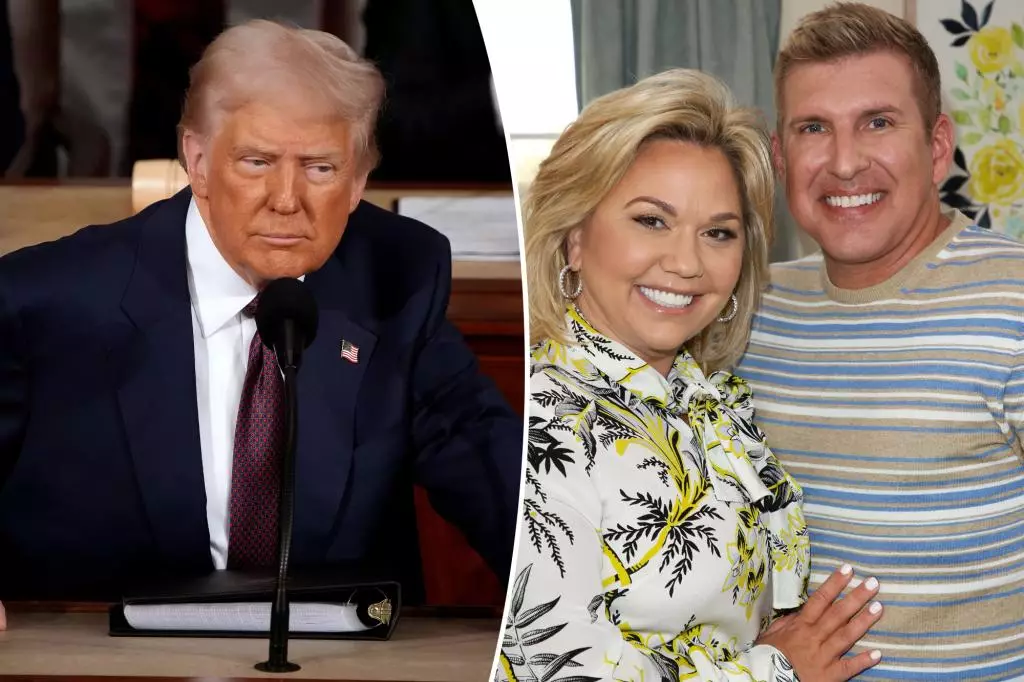The recent release of Todd and Julie Chrisley from prison after receiving pardons from President Donald Trump has stirred up a considerable amount of conversation across various social media platforms and news outlets. The couple, known for their popular reality show, “Chrisley Knows Best,” found themselves embroiled in a scandal involving bank fraud and tax evasion that ultimately led to their convictions in June 2022. While many celebrate their return to freedom, it’s vital to delve deeper into the implications of their pardons, the controversy surrounding their case, and what it might suggest about societal values.
The perception of the Chrisleys has always been polarizing. On one hand, they are seen as victims of unfair prosecution, especially given their high-profile status. On the other, they have been labeled as career criminals who manipulated the system for personal gain. With Trump’s intervention, the narrative further complicates, drawing lines on political divides that influence how Americans perceive justice and accountability.
The Role of Celebrity in Justice
The notion that a high-profile individual can garner leniency through celebrity status is not unfamiliar but raises serious questions about fairness. Todd and Julie’s attorney, Alex Little, argued that their prosecution was marred by political bias, suggesting that their conservative values played a role in their indictments. This statement resonates with a significant segment of the populace who believe that those in the public eye are often treated unfairly, not due to their actions, but due to external biases driven by their beliefs or lifestyle.
However, this viewpoint can also be seen as an example of victimhood that undermines the seriousness of the charges they faced. The sentencing memorandum issued by prosecutors portrayed a very different image, branding Todd and Julie as “career swindlers.” Given the nature of their crimes—fraud against banks and misleading financial institutions—one must question whether their celebrity status materially impacted their legal proceedings or the public’s response to their case.
Pardon Politics: A New Precedent?
The act of a sitting president granting pardons is not novel, yet it often serves as a litmus test for ethical leadership. Trump’s decision to pardon the Chrisleys is particularly notable in a landscape filled with discussions about fairness, legality, and the moral fabric of America’s judicial system. This incident not only reflects Trump’s political stance but also raises concerns about the integrity of the pardon system itself.
Critics argue that high-profile pardons can set a dangerous precedent, wherein justice is perceived as negotiable and privilege can override accountability. Is this truly a step towards correcting a “deep injustice,” or is it simply an instance of leveraging influence? Such questions complicate the celebration of the Chrisleys’ release, sparking discussions about who truly benefits from political interventions and at what cost.
The Impact on Families and Society
While Todd and Julie’s release means a reunion with their children and the opportunity to rebuild their lives, one cannot ignore the broader implications of such a narrative. Their story is a microcosm reflecting the complexities of family struggles under scrutiny from the public eye and legal system alike. How many families face similar challenges but lack the means to secure leniency or navigate their way through the legal labyrinth?
Moreover, their financial transgressions and subsequent pardons underscore the disparities in the justice system. Many ordinary citizens facing similar charges often do not have the resources, connections, or platforms to advocate for themselves effectively. The Chrisleys’ situation illuminates a significant gap in societal equity, making it vital to reassess what justice truly looks like in America.
The release of Todd and Julie Chrisley underscores a narrative that intertwines celebrity culture, justice system flaws, and the perennial debate over moral accountability. In a world that often feels defined by privilege and influence, their story stands as a testament to the ongoing dialogue about fairness and ethics in the fabric of American society.

Leave a Reply